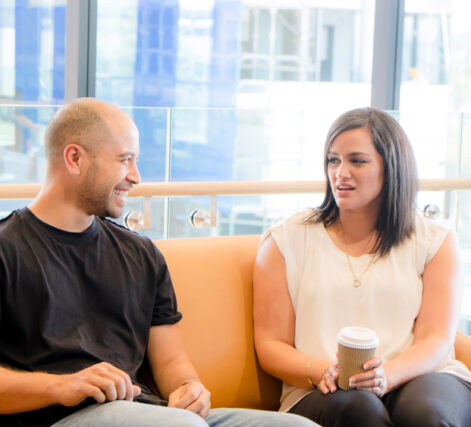Reading people can be surprisingly useful in everyday life, but no one wants to feel like they’re being analysed.

However, you don’t have to bore a hole into someone or quiz them with 20 questions to get a feel for who they are. It’s a lot easier (and less creepy) than that. Here are a few subtle ways to get a sense of someone without making it obvious.
1. Pay attention to their body language.

Body language can reveal a lot about someone’s feelings. Notice if they lean in when they talk, cross their arms, or avoid eye contact. Leaning in can show interest, while crossed arms might indicate discomfort or defensiveness. Observing these cues can help you gauge their mood and comfort level without saying a word.
2. Look at how they treat the people around you.

Watching how someone interacts with other people, like service workers or colleagues, is a great way to see their true character. If they’re polite and respectful, it’s a good sign they value people. On the other hand, dismissive behaviour could indicate a lack of empathy. How they treat people around them is often how they’ll treat you over time.
3. Listen closely to the words they choose.

People often reveal more through their choice of words than they realise. For example, someone who says, “I have to” a lot might feel obligated or pressured, while “I get to” suggests they’re more positive or grateful. Paying attention to their language can give you a glimpse into their mindset and priorities.
4. Notice their energy and enthusiasm level.

Energy can be a big indicator of someone’s personality or mood. Do they seem upbeat, or are they more reserved and low-energy? High-energy people are often outgoing and open, while more subdued folks may prefer a calmer approach. Observing their energy level can help you match their vibe and make the interaction smoother.
5. Watch how they respond to small favours.

Do they thank you if you hold the door or give a compliment, or do they brush it off? Gratitude and acknowledgment can show someone’s attitude towards kindness and respect. People who are quick to acknowledge small gestures often have a friendly, approachable personality. Small reactions like these can reveal a lot about their nature.
6. Observe their facial expressions closely.

Facial expressions can be easy to miss, but can reveal genuine emotions. A quick smile, a slight frown, or a raised eyebrow can all be clues to how someone’s really feeling. These micro-expressions are often involuntary and can give away more than words. Being mindful of their face can offer quick, honest insights.
7. Look at how they position themselves.

How someone positions their body, like turning toward or away from you, says a lot about their interest level. If they’re facing you directly, they’re likely engaged, but if they’re angled away, they might be ready to move on. Subtle shifts in body position can reveal how comfortable or interested they are in the conversation.
8. Notice if they mirror your movements.

Mirroring is when someone subconsciously copies your body language, like crossing their legs when you do. It’s a sign that they’re comfortable and in sync with you. When people mirror each other, it usually means they’re building rapport, even if they don’t realise it. If they’re mirroring you, you’re probably on the same wavelength.
9. Pay attention to pauses in conversation.

Pauses and silences can be as telling as words. If someone hesitates before answering, they might be thinking carefully about what to say. Meanwhile, quick, smooth replies suggest they’re comfortable or know the topic well. Silence can say a lot—sometimes, it’s what’s left unsaid that speaks the loudest.
10. Watch how they handle interruptions.
 Source: Unsplash
Source: Unsplash If they’re interrupted, do they get flustered or handle it calmly? Someone who stays composed likely has good emotional control, while someone who reacts strongly may have less patience. How they deal with interruptions can hint at their stress tolerance and overall demeanour.
11. See if they focus on themselves or other people more.
 Source: Unsplash
Source: Unsplash If they talk mainly about themselves, it could signal a self-focused personality, while asking about you shows curiosity and openness. People who balance talking about themselves and showing interest in you often have a healthy balance. Observing this can help you see if they’re open to genuine connection or prefer to keep the spotlight.
12. Notice their response to personal questions.
 Source: Unsplash
Source: Unsplash Asking a casual personal question can be a way to gauge their openness. If they answer easily, they might be comfortable with self-disclosure, while hesitating or deflecting could mean they’re more private. Understanding their comfort with sharing helps you see where they stand in terms of openness and trust.
13. Observe their punctuality.
 Source: Unsplash
Source: Unsplash If you’re meeting up, notice if they arrive on time, early, or late. Punctuality can reflect their reliability and respect for other people’s time. Being early or on time often suggests they’re dependable, while consistently late arrivals might mean they’re more relaxed—or less organised. This small detail can tell you about their approach to commitment.
14. See how they handle differences in opinion.

If you mention a different viewpoint, do they get defensive or are they open to hearing you out? People who handle differences gracefully are usually more flexible and understanding. Observing their reaction can tell you if they’re open-minded or if they struggle with opposing ideas. It’s a good way to gauge their tolerance for differing perspectives.
15. Pay attention to their follow-through.

If they say they’ll do something—like following up or setting another meet-up—do they actually follow through? People who follow up tend to be more dependable and sincere. If they don’t, it could mean they’re less invested. Following through on promises, even small ones, is a strong indicator of integrity.
16. Notice their reaction to unexpected events.

If something unexpected happens, like a loud noise or sudden interruption, their reaction can reveal their level of patience and adaptability. Do they laugh it off or get visibly annoyed? Handling surprises well often shows resilience, which can make them more enjoyable to be around. People who adapt easily are often easier to connect with in the long run.




